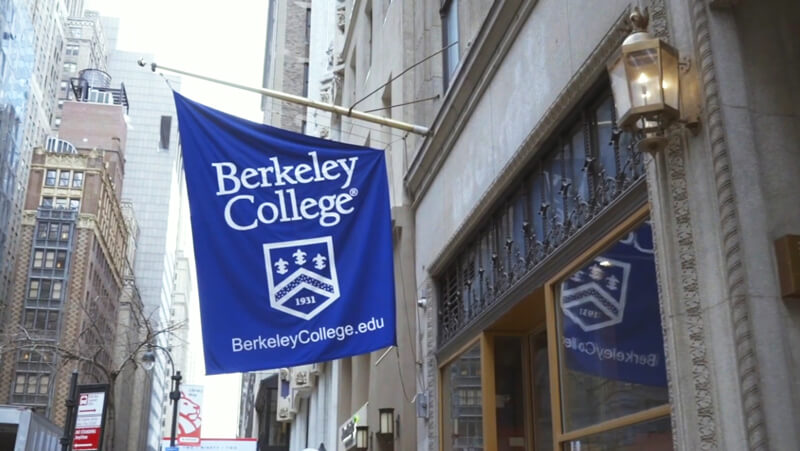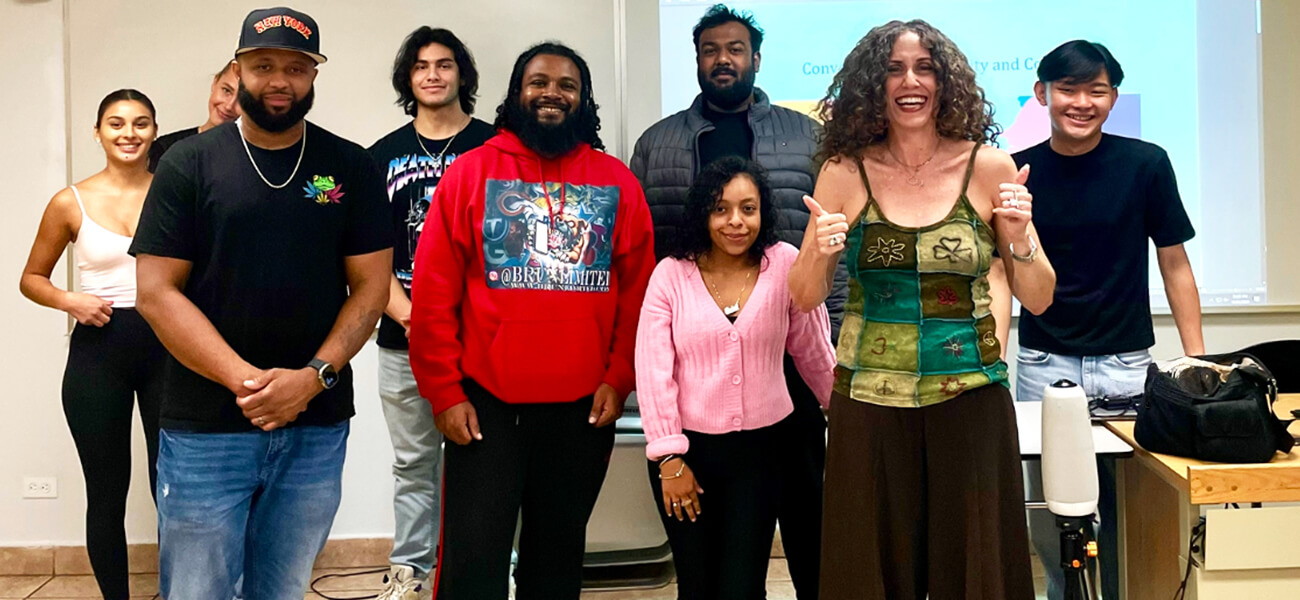International Student Department
Current International Students
The staff at the International Student Department takes great pride in supporting you during your program. Our staff can assist you with many matters related to life at Berkeley and in the community, as well as provide you with important information regarding your rights and responsibilities as an international student in the United States.
International Student Guide
The Berkeley College International Student Guide was designed to provide essential information and helpful resources for our international students.
F-1 Student Resources
Current and prospective students can visit the U.S. Department of Homeland Security's websites.
Hours and Location
Berkeley College International Department
3 East 43rd Street
New York, New York 10017 USA
Office Hours: 9 AM - 5 PM Monday through Friday
Telephone: U.S. Dialing Code - 212-687-3730
Email: International@BerkeleyCollege.edu

Frequently Asked Questions
To be in F-1 status means that you are in the United States as an F-1 student visa holder, enrolled in a full-time program, following the visa regulation guidelines to maintain your status. To maintain status, an international undergraduate student should enroll in a minimum of 12 - 18 credits per semester with the majority of their courses on-site. Graduate students must enroll in a minimum of 9 credits per semester. For maintaining full-time continuous enrollment, students are expected to enroll for two consecutive semesters per year (one academic year) with the option to enroll for a third semester.
The Student and Exchange Visitor Information System (SEVIS) is the web-based system that the U.S. Department of Homeland Security (DHS) uses to maintain information on Student and Exchange Visitor Program (SEVP)-certified schools and the F and M students who come to the United States to attend those schools.
A Social Security Number (SSN) is issued to track earnings over a worker's lifetime. Only students holding F-1 status who are authorized to work in the United States may apply for an SSN. For further information, you can visit: https://www.ssa.gov/number-card and International Students and Social Security Numbers. Please meet with an International Advisor for additional information.
There are limited work opportunities available in the United States for F-1 students. For this reason, before coming to the United States, F-1 students must prove they have the financial ability (e.g., present bank statements) to pay for tuition and living expenses while studying. If you decide that you want to work, the first step is always to speak with your International Student Advisor who is a designated school official.
On-Campus
On-campus employment is available to F-1 students whose status is Active in SEVIS. On-campus employment is specific to work that takes place on campus or at an off-campus location that is affiliated with the school. Students are eligible for on-campus employment up to 20 hours per week while maintaining F-1 Status. Students can visit the International Office for a letter to bring with them to the Social Security Office.
Off-Campus
Off-campus employment is work that takes place outside of a school campus. Off-campus employment is only available to F-1 students who have completed at least one full academic year of their program of study, and/or who have an economic hardship that qualifies for the U.S. Department of Homeland Security's emergent circumstances. Students must receive approval to work legally off-campus. To learn about off-campus employment, please meet with an International Advisor.
Curricular Practical Training
Curricular Practical Training (CPT) is only available for F-1 students when it is part of an established curriculum within a school. CPT must relate to your program of study, however, unlike Optional Practical Training (OPT), and other work, CPT can be full-time based on program requirements. CPT is available to Berkeley College F-1 students in a degree program while taking the required Internship Course.
Optional Practical Training
Optional Practical Training (OPT) is a form of temporary employment that directly relates to your program of study. You can apply for OPT during your program of study after you have completed one full academic year, which is known as pre-completion OPT, or after you finish your program of study, known as post-completion OPT. To apply for OPT, students must meet with an International Advisor.
Please see our F-1 OPT Questions and Answers Guide for more information.
Any F-1 student in lawful status may apply for a driver’s license or state identification card, per state or territorial law. The student must present supporting documents required to verify legal presence in the United States.
Please see our ID and Driver’s License Information Guide outlining the documents you need to receive a driver’s license or state identification card.
The U.S. Immigration and Customs Enforcement offers further information on obtaining this benefit as an F-1 student.
SEVIS I-901 Fee
There is a one-time fee for each SEVIS I-20 that you receive. You must pay this fee before you can apply for a visa at a United States Embassy or Consulate. To pay this fee visit https://www.fmjfee.com and once you pay your I-901 SEVIS Fee, you must print the receipt as proof of payment and take it with you to your visa appointment and when you travel to the United States.
Passport
A passport is a travel document that proves your citizenship. If you are reentering the United States, your passport must be valid at least 6 months in the future. To renew your passport, please contact your country’s Embassy or Consulate.
SEVIS I-20 - Certificate of Eligibility for Nonimmigrant Student Status
The SEVIS I-20 document is issued by an International Student Advisor through SEVIS, a database that allows the U.S. Department of Homeland Security to receive information about international students. A SEVIS I-20 is the primary document to show that you have been admitted to school in the United States and that you are authorized to apply for admission to the United States in F-1 visa status.
Visa
A visa is a document that allows a visitor to travel to a United States port of entry and request permission to enter the United States in that visa category. Your passport and SEVIS I-20 must remain valid at all times while you are in the United States. Your F-1 visa may expire during your study program. You may remain in the United States on an expired F-1 visa as long as you are maintaining your student status with a valid SEVIS I-20. However, the next time you travel abroad you must obtain a new F-1 student visa.
Form I-94
Form I-94 shows that you have been legally admitted to the United States, the class of admission, and the authorized period of stay. Since your purpose is studying full-time, your I-94 should indicate that you have been granted F-1 status for D/S. D/S means “duration of status”, meaning as long as you are maintaining your student status. The I-94 Entry record is required evidence for application for any benefit of F-1 visa sponsorship (ID license application, work authorization, H1B application, etc.).
You are required to notify an International Advisor of any change of address within 10 days of moving so we may report it to the U.S. Department of Homeland Security.
F-1 students must pursue a full-time course of study (at least 12 credits for undergraduate and 9 credits for graduate) per semester or obtain permission to take a reduced course load (RCL).
Students must receive prior approval from an International Advisor before taking a reduced courseload (RCL). There are limited reasons as to why you may take a RCL:
- Documented temporary medical reasons
- Academic reasons
- Last semester of your degree program and you have less than 12 required credits to graduate
F-1 students may take an annual vacation semester and remain in the United States while not registered full-time. You are eligible for a vacation semester after completing two full-time consecutive (in a row) semesters with plans to register for the following semester. During this annual vacation you may register for online classes, part-time classes, or no classes.
Before taking a vacation you must meet with an International Advisor to discuss your eligibility and fill out an International Student Change Form.
The International Division is required to report any updates to the U.S. Department of Homeland Security and update your I-20 in SEVIS. It is your responsibility to ensure the information on your I-20 is up to date and accurate. You must meet with an International Advisor before any of the below events:
- Program Extension
- Change of Degree Level
- Change of Major
- Change of Funding
- Change of Name
- Changing Schools
Make sure you keep every I-20 you receive for your records.
Berkeley College does not require F-1 students to have health insurance coverage. However, we strongly encourage students to obtain a health insurance plan due to the high costs associated with the United States health care system. You can also purchase health insurance plans specifically for F-1 students. The United States does not have a nationalized health care system. As a result, students are responsible for paying all costs associated with medical and dental care. To learn about different insurance plans, please contact an International Advisor.
Each year the International Student Department sponsors cultural events. In the past, those events have included ballet performances, United Nations tours, and lower Manhattan dinner cruises.




